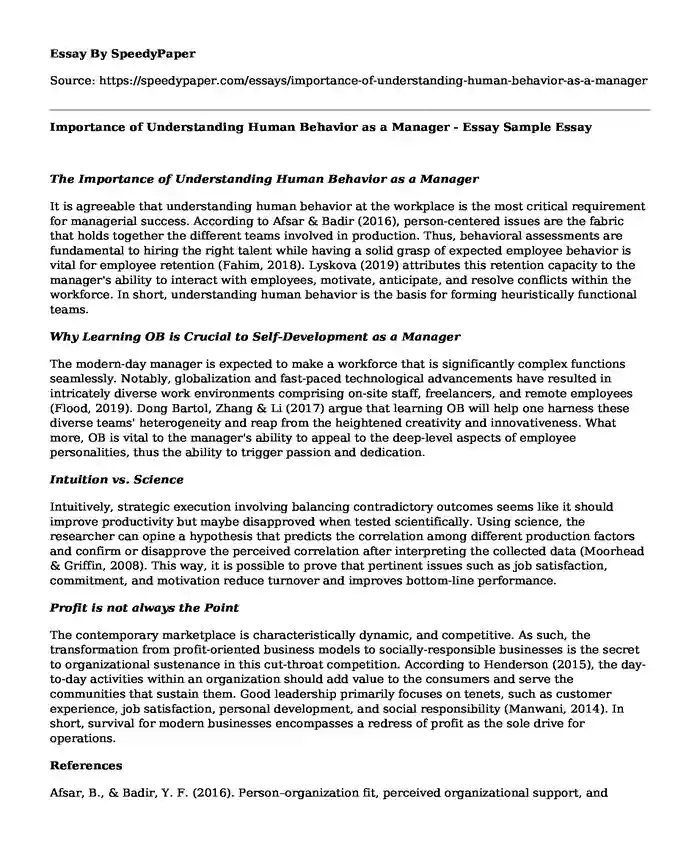
| Type of paper: | Essay |
| Categories: | Management Human behavior |
| Pages: | 3 |
| Wordcount: | 564 words |
The Importance of Understanding Human Behavior as a Manager
It is agreeable that understanding human behavior at the workplace is the most critical requirement for managerial success. According to Afsar & Badir (2016), person-centered issues are the fabric that holds together the different teams involved in production. Thus, behavioral assessments are fundamental to hiring the right talent while having a solid grasp of expected employee behavior is vital for employee retention (Fahim, 2018). Lyskova (2019) attributes this retention capacity to the manager's ability to interact with employees, motivate, anticipate, and resolve conflicts within the workforce. In short, understanding human behavior is the basis for forming heuristically functional teams.
Why Learning OB is Crucial to Self-Development as a Manager
The modern-day manager is expected to make a workforce that is significantly complex functions seamlessly. Notably, globalization and fast-paced technological advancements have resulted in intricately diverse work environments comprising on-site staff, freelancers, and remote employees (Flood, 2019). Dong Bartol, Zhang & Li (2017) argue that learning OB will help one harness these diverse teams' heterogeneity and reap from the heightened creativity and innovativeness. What more, OB is vital to the manager's ability to appeal to the deep-level aspects of employee personalities, thus the ability to trigger passion and dedication.
Intuition vs. Science
Intuitively, strategic execution involving balancing contradictory outcomes seems like it should improve productivity but maybe disapproved when tested scientifically. Using science, the researcher can opine a hypothesis that predicts the correlation among different production factors and confirm or disapprove the perceived correlation after interpreting the collected data (Moorhead & Griffin, 2008). This way, it is possible to prove that pertinent issues such as job satisfaction, commitment, and motivation reduce turnover and improves bottom-line performance.
Profit is not always the Point
The contemporary marketplace is characteristically dynamic, and competitive. As such, the transformation from profit-oriented business models to socially-responsible businesses is the secret to organizational sustenance in this cut-throat competition. According to Henderson (2015), the day-to-day activities within an organization should add value to the consumers and serve the communities that sustain them. Good leadership primarily focuses on tenets, such as customer experience, job satisfaction, personal development, and social responsibility (Manwani, 2014). In short, survival for modern businesses encompasses a redress of profit as the sole drive for operations.
References
Afsar, B., & Badir, Y. F. (2016). Person–organization fit, perceived organizational support, and organizational citizenship behavior: The role of job embeddedness. Journal of Human Resources in Hospitality & Tourism, 15(3), 252-278.
Dong, Y., Bartol, K. M., Zhang, Z. X., & Li, C. (2017). Enhancing employee creativity via individual skill development and team knowledge sharing: Influences of dualfocused transformational leadership. Journal of Organizational Behavior, 38(3), 439-458.
Fahim, M. G. A. (2018). Strategic human resource management and public employee retention. Review of Economics and Political Science.
Flood, F. (2019). Leadership in the Remote, Freelance, and Virtual Workforce Era.
Henderson, D. (2015). The Role of Business in the World of Today1. Business, Capitalism and Corporate Citizenship: A Collection of Seminal Essays, 14.
Lyskova, I. (2019, April). Conceptual Basis of the Formation of Organizational Behavior Quality in the Condition of Knowledge Economy. In 3rd International Conference on Culture, Education and Economic Development of Modern Society (ICCESE 2019). Atlantis Press.
Manwani, H. (Jan 13, 2014). Profit's not always the point {Video}. YouTube. https://www.youtube.com/watch?v=ihoR9B7p-1Q
Moorhead, G., & Griffin, R. W. (2008). Organizational behavior managing people and organizations. Dreamtech Press.
Cite this page
Importance of Understanding Human Behavior as a Manager - Essay Sample. (2023, Dec 13). Retrieved from https://speedypaper.net/essays/importance-of-understanding-human-behavior-as-a-manager
Request Removal
If you are the original author of this essay and no longer wish to have it published on the SpeedyPaper website, please click below to request its removal:
- Free Essay on Workplace as a Site of Culture
- Project Management Free Essay: Gantt Chart Example
- Competitive Strategy and Supply Chain Management - Essay Sample for Everyone
- Essay Example on Handmade Company's Network Management and Security
- Offenders With Special Needs - Free Paper Sample
- Free Essay Sample on Deviant Behavior
- Navigating Adolescent Risk-Taking: The Dual System Model in Decision-Making - Essay Sample
Popular categories




